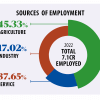1.38cr people underemployed

For nearly two years, Raushan Mahmud has been working as a cashier at a firm that produces garment accessories in Gazipur.
But this is not the job the 28-year-old man from Sirajganj longed for. He wished to work at a government organisation or a bank.
“I got this job a year after receiving a master’s degree in accounting from Dhaka College in 2016. I’m not enjoying it. The salary is low and there is no job security,” said Raushan, who is now looking for a better job.
He is one of the thousands of graduates who are holding jobs far below their expectations. In other words, they are underemployed.
Now the country has 1.38 crore underemployed people. Of them, 45.3 percent are in the service sector, 30.6 percent in the agriculture sector and 24.1 percent in the industry sector, says a government study.
The General Economics Division (GED) under the planning ministry conducted the study, the first of its kind in the country, between May and June this year to get an insight into the nexus of economic growth, employment generation, productivity and investment.
Underemployment is related to a situation where a person’s employment is inadequate in terms of working hours, earnings, productivity and use of skills, and the person is looking for better or additional work in conformity with his or her education and skills.
Of the underemployed people, 19.7 percent are looking for new or additional jobs as their present jobs are temporary, while 15.8 percent are looking for new jobs to get higher salary, the study pointed out.
It further said 9 percent want to work for more hours, 8.7 percent wish to have better jobs and activities, 8.6 percent want to work in higher ranks and 7.7 percent are in fear of losing jobs.
The study will be used as an approach paper for preparation of the upcoming 8th Five Year Plan and background paper for preparation of the Vision 2041.
Talking to this newspaper, Prof AK Azad Chowdhury, former chairman of the University Grants Commission, said, “Underemployment is a less-talked-about issue in the country.
“In fact, underemployment is unemployment,” he noted.
THE FACTORS
“There are many factors that cause underemployment. When workers outnumber decent jobs, they will take anything they can get to pay the bills. It forces skilled and educated workers to take low-skilled, part-time jobs,” Zahid Hussain, former lead economist at the World Bank’s Dhaka office, told The Daily Star.
Experts also blamed the mismatch between the skills offered by the country’s education system and the job requirements in various sectors.
The knowledge and skills that graduates acquire at educational institutions have little application in work, making them less relevant in the labour market.
Bangladesh’s tremendous economic growth has been unable to create jobs proportionately over the last decade. The country has seen little progress in the industry sector and 85 percent of the jobs are in the informal sector, mentions the government study.
“Mismatch between the skills demanded and the skills supplied is another major reason for underemployment in Bangladesh. Many college graduates with master’s degrees in subjects not in high demand in the job market take what they get,” said Zahid.
They may end up as caretakers of apartment buildings, waiters, or Uber drivers. Technological change causes underemployment as well. ATM machines and mobile banking, for instance, have replaced the need for many bank tellers, he added.
Prof Azad thinks most of the graduates lack both hard and soft skills.
EFFECTS
The underemployed people often feel neglected and frustrated, and in the worst cases, they become addicted to drugs and indulge in criminal activities, say experts.
“Underemployment has effects similar to those of unemployment. Both underpin low living standards,” said Zahid.
“In extreme cases, youth underemployment can lead to deviant behaviour such as drug addiction …”
They experience high stress and anxiety as a result of job insecurity and low salary, said the economist, adding that some of them retrain for different fields, while others downscale their lifestyle and accept long-term underemployment.
WHAT NEEDS TO BE DONE
The study recommended ensuring quality of education and training.
“The problem of skill mismatch needs to be reduced. Sector-specific training needs to be provided to the workers,” it says.
Steps need to be taken to create decent jobs with fair income and also ensure security at workplace, social protection for families, and better prospect for personal development, the study mentions.
Stressing the need for revamping the education system, Prof Azad said the universities should continuously update their curriculum and design it in line with the need of different sectors.
“Universities here do not update curriculum regularly. We need technology-based education system. The students need to have proficiency in English and acquire skills such as computer literacy and analytical ability,” he added.


 For all latest news, follow The Daily Star's Google News channel.
For all latest news, follow The Daily Star's Google News channel. 








Comments